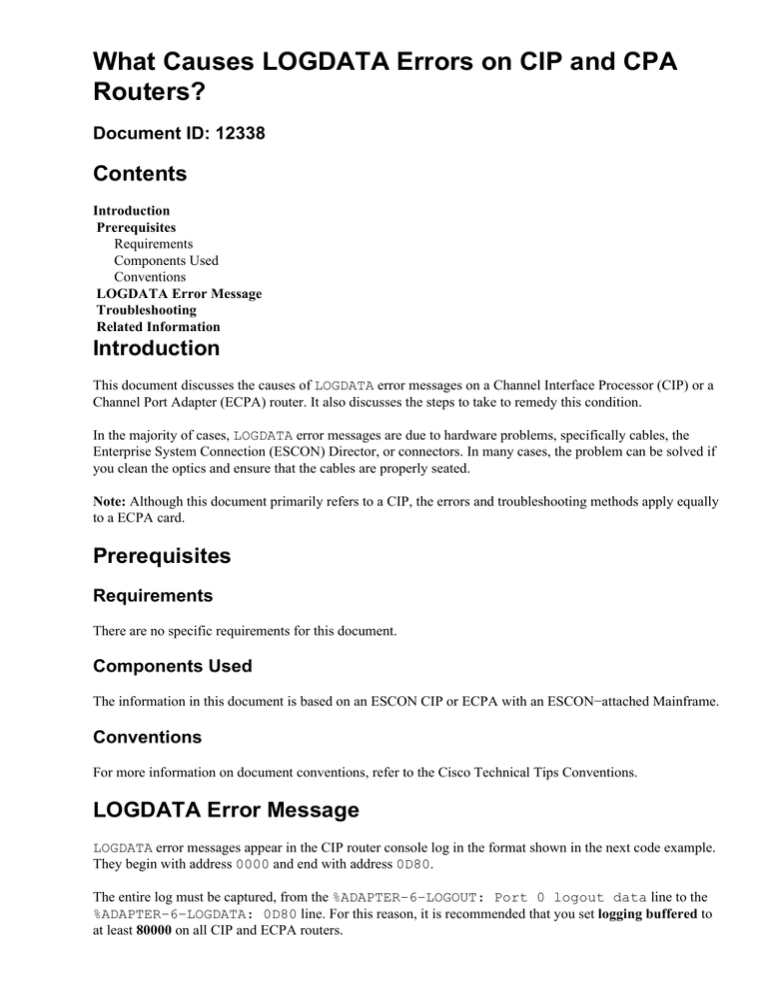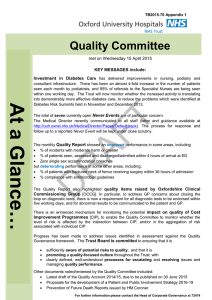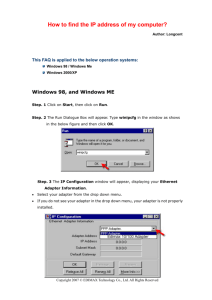
What Causes LOGDATA Errors on CIP and CPA
Routers?
Document ID: 12338
Contents
Introduction
Prerequisites
Requirements
Components Used
Conventions
LOGDATA Error Message
Troubleshooting
Related Information
Introduction
This document discusses the causes of LOGDATA error messages on a Channel Interface Processor (CIP) or a
Channel Port Adapter (ECPA) router. It also discusses the steps to take to remedy this condition.
In the majority of cases, LOGDATA error messages are due to hardware problems, specifically cables, the
Enterprise System Connection (ESCON) Director, or connectors. In many cases, the problem can be solved if
you clean the optics and ensure that the cables are properly seated.
Note: Although this document primarily refers to a CIP, the errors and troubleshooting methods apply equally
to a ECPA card.
Prerequisites
Requirements
There are no specific requirements for this document.
Components Used
The information in this document is based on an ESCON CIP or ECPA with an ESCON−attached Mainframe.
Conventions
For more information on document conventions, refer to the Cisco Technical Tips Conventions.
LOGDATA Error Message
LOGDATA error messages appear in the CIP router console log in the format shown in the next code example.
They begin with address 0000 and end with address 0D80.
The entire log must be captured, from the %ADAPTER−6−LOGOUT: Port 0 logout data line to the
%ADAPTER−6−LOGDATA: 0D80 line. For this reason, it is recommended that you set logging buffered to
at least 80000 on all CIP and ECPA routers.
Jan 7 09:31:50 CST: %CIP2−6−MSG: slot2 %ADAPTER−6−LOGOUT: Port 0 logout data.
Adapter microcode C50602D4
Jan 7 09:31:50 CST: %CIP2−6−MSG: slot2 %ADAPTER−6−LOGDATA: 0000 D5E2C3C1
00000D60 0A000120 00000000 FDE81572 0048A000 00000000 E8000000
Jan 7 09:31:50 CST: %CIP2−6−MSG: slot2 %ADAPTER−6−LOGDATA: 0020 00000800
08180001 08D38400 07D301A1 10120C00 5D000010 0048A000 01000000
Jan 7 09:31:50 CST: %CIP2−6−MSG: slot2 %ADAPTER−6−LOGDATA: 0040 00000000
00400003 C6010000 A0C20001 00114100 00117940 00112400 00118100
Troubleshooting
LOGDATA error messages only occur on ESCON channel connections. Most of the time, LOGDATA records
indicate that there was some type of transmission error or protocol error on the link. In order to troubleshoot
this error condition, a few questions must be answered:
• Did this error condition cause an outage?
• Is this the first occurrence of this error?
• Were there any changes at the physical layer, for example cables, the ESCON Director, and so forth?
If this error condition did not cause any outage, then it was a recoverable code violation. If this error condition
did cause an outage (for example, a fatal error), further investigation is required.
For transmission errors, the most likely causes are poorly seated cables, dirty optics, bad transmitting LEDs,
or bad receivers.
Protocol errors indicate that either the CIP, the ESCON Director, or the mainframe violated the ESCON
protocol. Most of these errors (even the protocol errors) are recoverable without the application (virtual
telecommunications access method [VTAM] or TCP/IP) even knowing about it.
A good place to start to troubleshoot is with the show extended channel statistics or show extended channel
subchannel commands. If there clearly were transmission errors, make sure that you clean the optics and that
the cables are properly seated. Some bit errors are not reported in the statistics; so, even if those statistics are
0, there still could have been a code violation.
In 99.999% of all cases, LOGDATA error messages are due to hardware: cables, the ESCON Director, or
connectors. In either case, the error dump can only be analyzed by IBM and may not always be conclusive.
Given that 99.999% of the time this is due to hardware, it is extremely important to completely eliminate
hardware issues before you consider sending your error dump to be decoded. Also, when you run the latest
available CIP microcode, you ensure that any fixes for these issues are applied. Once you rule out hardware
problems, Cisco Technical Support can send the dump to IBM for analysis.
Note: It is important to again note that all CIP routers should have logging buffered 80000, at the very least,
so that the full dump is captured. If your syslog server address is unreachable and the log output is lost
because your logging buffered is only 4000, then you will have to wait for another occurrence to find out what
happened. This is undesirable.
Note: Each occurrence of the error starts with Port 0 logout data:
%CIP2−6−MSG: slot5 %ADAPTER−6−LOGOUT: Port 0 logout data.
Adapter microcode C50602D4
Each occurrence ends with LOGSAME:
%CIP2−6−MSG: slot5 %ADAPTER−6−LOGSAME: 0D80 to 1000
Note: In some customer environments, LOGDATA records with multiple error messages can occur when the
mainframe takes longer than 500 ms to respond to device−level activity. The ESCON architecture states that
this timeout value can range from 400 ms to 850 ms. To avoid some of the occurrences of LOGDATA, use
CIP21−21 or higher or CIP22−28 or higher, as per Cisco bug ID CSCdj84218 (registered customers only) .
Related Information
• How to Select and Upgrade CIP or CPA Microcode for Various Cisco IOS Software Releases
• Technical Support & Documentation − Cisco Systems
Contacts & Feedback | Help | Site Map
© 2014 − 2015 Cisco Systems, Inc. All rights reserved. Terms & Conditions | Privacy Statement | Cookie Policy | Trademarks of
Cisco Systems, Inc.
Updated: Sep 09, 2005
Document ID: 12338



